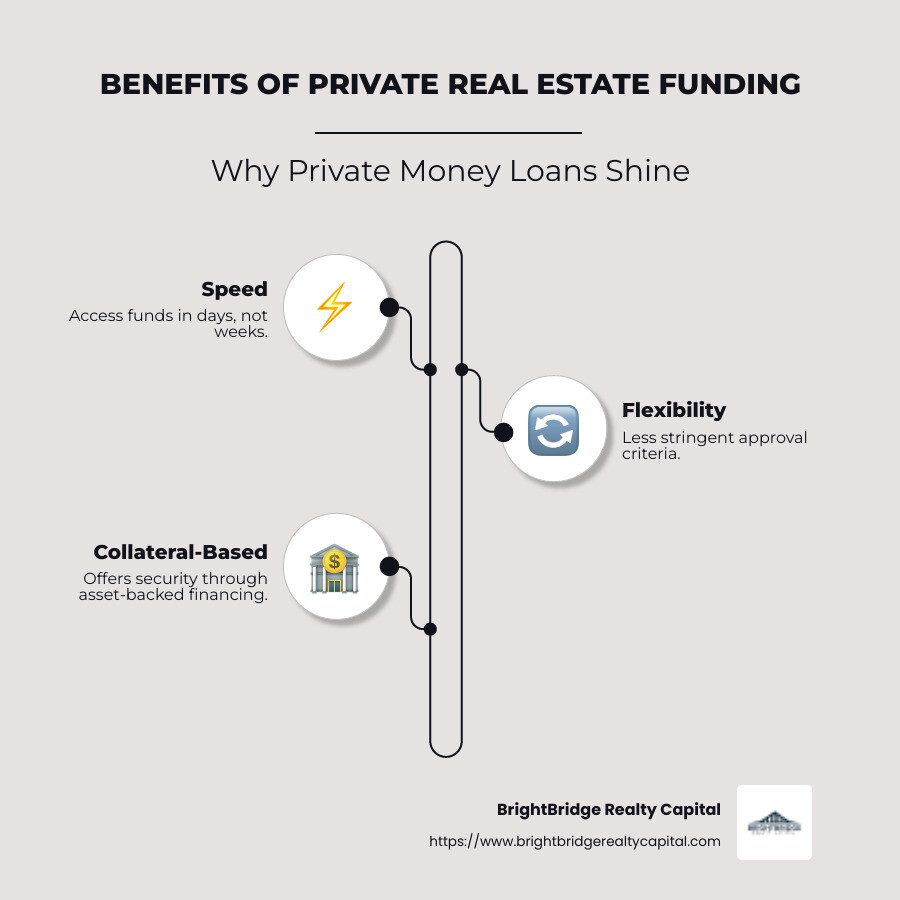Direct Deals: How to Leverage Private Real Estate Lenders

Private real estate funding provides a fast and flexible financial tool for real estate investors eager to seize opportunities without the long wait typical of traditional loans. When investors need quick cash to secure a promising deal, private money loans can be essential.
Key Features of Private Real Estate Funding:
- Speed: Access funds in days, not weeks.
- Flexibility: Less stringent approval criteria.
- Collateral-Based: Offers security to lenders through asset-backed financing.
Real estate investing thrives on swift action and adaptability, and private real estate funding perfectly meets these needs. Traditional banking often slows the process due to rigorous checks and lengthy approvals. In contrast, private money lenders, who aren’t tied to large institutions, offer a streamlined pathway to financing.
These lenders focus on the property’s potential value and not just the borrower's credit score. Thus, investors can act quickly when competition is fierce. Real estate investors seeking flexibility and speed in their financing will find private money loans an invaluable asset in their toolkit.

Private real estate funding terms you need:
Understanding Private Real Estate Funding
Private real estate funding is an alternative financing route that stands apart from traditional bank loans. It's a lifeline for investors who need to act fast in the real estate market. This funding type is ideal for those looking to bypass the red tape of conventional lenders.
Private Equity Real Estate
Private equity real estate is a key player in this space. It involves pooled funds from high-net-worth individuals and institutions to invest in real estate assets. Unlike public REITs, private equity real estate requires a substantial capital commitment and offers less liquidity.

Investors in private equity real estate funds enjoy a diversified portfolio managed by experienced professionals. These funds invest in various property types, from raw land to redevelopment projects. They aim for high returns, often in the range of 8% to 10%, but come with higher risks and longer lock-up periods.
Alternative Financing
Private real estate funding is also synonymous with alternative financing. This type of funding allows investors to tap into opportunities that might not fit the strict criteria of traditional banks.
Private lenders offer a flexible approach, often looking at the potential value of the property rather than the borrower's creditworthiness. This flexibility is crucial for investors looking to finance luxury residential assets or speculative developments, which traditional banks might shy away from.

Key Takeaways
- Private equity real estate provides a way for investors to pool resources and invest in diverse real estate assets.
- Alternative financing like private money loans offers speed and flexibility, focusing on the property's potential rather than the borrower's credit score.
Whether you're investing in a luxury condo or developing vacant land, private real estate funding offers the agility and speed needed to capitalize on real estate opportunities.
Benefits of Private Real Estate Lenders
Private real estate lenders offer significant advantages, especially for investors eager to seize opportunities quickly. Here's why they stand out:
Speed
Time is money in real estate. Private lenders know this and offer fast approvals that can be a game-changer. Unlike traditional banks that may take weeks, private lenders can approve loans in just days. This quick turnaround is crucial when you're trying to close deals in a competitive market. For instance, if a distressed property hits the market, having access to immediate funds can help you secure the deal before other buyers even get a chance.
Flexibility
Private real estate funding shines in its flexibility. Unlike conventional loans, which have rigid terms and conditions, private lenders tailor their offerings to meet your specific needs. They consider the potential of the property rather than sticking strictly to credit scores or financial history. This means you can negotiate terms that align with your investment strategy, whether you're flipping a property or holding it for rental income.
Collateral-Based
Private lenders focus on the property itself as collateral, which opens doors for investors with less-than-perfect credit. This collateral-based approach means the property's value and potential are the main considerations, not your past financial hiccups. This is particularly beneficial for high-value properties like luxury residential assets or projects involving vacant land for development, which may not meet a bank's strict criteria.
In summary, private real estate lenders provide the speed, flexibility, and collateral-based lending that real estate investors need to thrive. Whether you're looking to flip a property quickly or invest in a long-term rental, these lenders offer the tools to make it happen efficiently.
Next, we'll explore the different types of private real estate loans available to investors.
Types of Private Real Estate Loans
When diving into private real estate funding, understand the various loan types available. Each type serves a unique purpose, catering to different investment strategies and needs. Let's break down three popular options: bridge loans, construction loans, and rescue refinance loans.
Bridge Loans
Bridge loans are short-term loans designed to "bridge" the gap between buying a new property and selling an old one. They provide quick access to capital, perfect for investors who need to act fast in a competitive market. For example, if you're eyeing a promising fix-and-flip opportunity, a bridge loan can offer the funds needed to purchase and renovate the property before selling it for a profit. These loans typically have terms ranging from a few months to a couple of years, allowing investors the flexibility to complete their projects without long-term commitments.
Construction Loans
Construction loans are custom for builders and developers looking to finance the construction of new properties. These loans cover the costs of building from the ground up, including materials, labor, and permits. With terms usually between 6 to 12 months, they are ideal for short-term projects where quick completion is necessary. The beauty of construction loans lies in their ability to fund projects that traditional lenders might shy away from due to the perceived risks involved. By focusing on the project's potential, private lenders can offer the flexibility needed to bring ambitious real estate visions to life.
Rescue Refinance
Rescue refinance loans are a lifeline for investors facing unexpected hiccups in their funding plans. Imagine you've secured a property but your initial financing falls through at the last minute. A rescue refinance loan provides the necessary capital to complete the purchase or refinance an existing loan, ensuring you don't lose the deal. These loans are typically short-term, ranging from a few months to half a year, and offer quick access to funds, often within days. This makes them invaluable for investors needing to pivot quickly and keep their projects on track.
In essence, understanding these types of loans can empower investors to choose the right tool for their real estate endeavors. Whether you're bridging a financial gap, constructing a new development, or rescuing a faltering deal, private real estate loans offer the custom solutions needed to succeed in a dynamic market.
Next, we'll guide you on how to choose the right private lender for your project.
How to Choose the Right Private Lender
Choosing the right private lender isn't just about finding someone to finance your project; it's about finding a partner who aligns with your goals. Here are three key factors to consider: collateral, experience, and exit strategy.
Collateral
Collateral is a critical component in securing a private loan. It's the asset that backs your loan, giving the lender confidence that they can recoup their investment if things don't go as planned. For private real estate funding, collateral typically includes the property you're investing in.
Tip: Look for lenders who are comfortable with the type of property you're offering as collateral. Some may prefer residential properties, while others might focus on commercial or land assets. The location of your property can also be a deciding factor, as many lenders specialize in specific markets.
Experience
Your experience as a real estate investor can significantly impact your loan terms. If you're new to the game, you might face higher interest rates or larger down payment requirements. However, presenting a solid business plan or a portfolio of previous projects can help mitigate these challenges.
Pro Tip: Even if you're just starting, transparency and a clear investment strategy can help build trust with your lender. Share your vision and demonstrate how you plan to make your project a success.
Exit Strategy
An exit strategy is your plan for repaying the loan. It's crucial for both you and the lender to have a clear understanding of how you'll pay off the loan at maturity. Common exit strategies include refinancing, selling the property, or using income from another venture.
Advice: Discuss your exit strategy in detail with potential lenders. A well-thought-out plan can reassure them of your ability to repay the loan, possibly leading to better terms.
By focusing on these three areas, you can find a private lender who not only provides the necessary funds but also supports your broader investment goals. Next, we'll tackle some frequently asked questions about private real estate funding.
Frequently Asked Questions about Private Real Estate Funding
What is a private money lender?
A private money lender is an individual or a company that provides loans to real estate investors without the stringent regulations of traditional banks. Unlike banks, private lenders have the flexibility to set their own terms and criteria, making them a popular choice for investors who need quick access to funds. These lenders focus more on the potential value of the property being invested in rather than the borrower's credit score. This is particularly beneficial for those with less-than-perfect credit or unconventional income sources.
How do private money loans differ from traditional loans?
Private money loans stand out from traditional loans in several key ways:
Speed: Private money loans can be approved and funded in days, not weeks or months, which is crucial in competitive markets. Traditional loans often have lengthy approval processes.
Flexibility: Private lenders can tailor loans to fit the specific needs of a project, including unique properties or complex situations. Traditional loans are more rigid and follow strict guidelines.
Collateral-Based: These loans primarily rely on the property as collateral, rather than the borrower's financial history. This allows investors with lower credit scores to still secure funding.
By focusing on the property's value and potential, private money loans provide a more accessible and flexible financing option for real estate investors.
What are the risks associated with private real estate funding?
While private real estate funding offers many benefits, there are also risks to consider:
Higher Interest Rates: Private money loans often come with higher interest rates compared to traditional loans. This can increase the overall cost of the investment if not managed carefully.
Shorter Loan Terms: These loans typically have shorter repayment periods, which means investors must have a solid exit strategy to repay the loan on time.
Potential for Loss: Since the property is used as collateral, failure to repay the loan can result in losing the asset.
Investors should conduct thorough due diligence and have a clear plan in place to mitigate these risks. Understanding both the benefits and challenges of private real estate funding is crucial for making informed investment decisions.
Conclusion
BrightBridge Realty Capital offers a powerful solution for real estate investors looking for quick and flexible funding. With our fast closings—often within a week—and competitive rates, we stand out as a top choice for those needing immediate capital without the red tape of traditional banks.
Our approach is simple: we cut out intermediaries to provide direct lending, ensuring a seamless and efficient process from start to finish. This means you can focus on what really matters—growing your real estate portfolio and seizing opportunities as they arise.
Why choose BrightBridge Realty Capital?
Speed: Time is money in real estate. Our fast approval and funding process keep you ahead in competitive markets.
Flexibility: We tailor our loans to fit your specific needs, whether you're flipping properties or building a rental portfolio.
Reliability: With our nationwide reach, you can trust us to deliver the capital you need, wherever your investment properties are located.
Partner with us to experience the ease and efficiency of working with a trusted private real estate lender. Whether you're a seasoned investor or new to the field, BrightBridge Realty Capital is here to support your journey.
Ready to get started? Explore our services and find how we can help you achieve your real estate goals.


